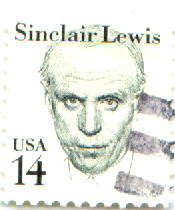Sinclair Lewis
 Harry Sinclair Lewis was born in Sauk Centre, Minnesota, and
graduated from Yale University. He took time off from school to
work at a socialist community, Helicon Home Colony, financed by
muckraking novelist Upton Sinclair. Lewis's Main Street
(1920)
satirized monotonous, hypocritical small-town life in Gopher
Prairie, Minnesota. His incisive presentation of American life
and his criticism of American materialism, narrowness, and
hypocrisy brought him national and international recognition. In
1926, he was offered and declined a Pulitzer Prize for
Arrowsmith
(1925), a novel tracing a doctor's efforts to maintain his
medical ethics amid greed and corruption. In 1930, he became the
first American to win the Nobel Prize for Literature.
Harry Sinclair Lewis was born in Sauk Centre, Minnesota, and
graduated from Yale University. He took time off from school to
work at a socialist community, Helicon Home Colony, financed by
muckraking novelist Upton Sinclair. Lewis's Main Street
(1920)
satirized monotonous, hypocritical small-town life in Gopher
Prairie, Minnesota. His incisive presentation of American life
and his criticism of American materialism, narrowness, and
hypocrisy brought him national and international recognition. In
1926, he was offered and declined a Pulitzer Prize for
Arrowsmith
(1925), a novel tracing a doctor's efforts to maintain his
medical ethics amid greed and corruption. In 1930, he became the
first American to win the Nobel Prize for Literature.
Lewis's other major novels include Babbitt (1922). George Babbitt is an ordinary businessman living and working in Zenith, an ordinary American town. Babbitt is moral and enterprising, and a believer in business as the new scientific approach to modern life. Becoming restless, he seeks fulfillment but is disillusioned by an affair with a bohemian woman, returns to his wife, and accepts his lot. The novel added a new word to the American language -- "babbittry," meaning narrow-minded, complacent, bourgeois ways. Elmer Gantry (1927) exposes revivalist religion in the United States, while Cass Timberlane (1945) studies the stresses that develop within the marriage of an older judge and his young wife.
